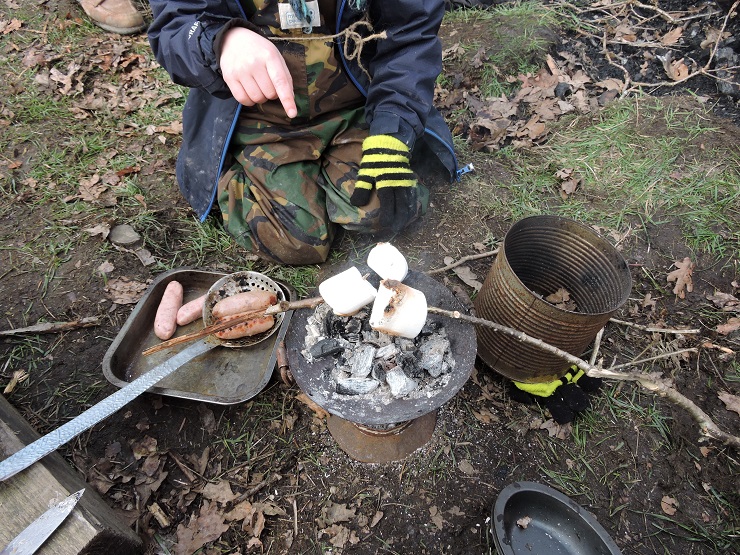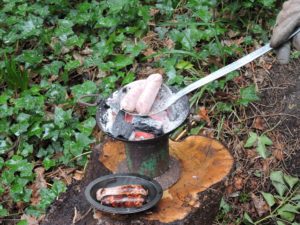I feel learning about other cultures, through experiencing their artefacts, is important because the resources are focused on bringing to life the culture and daily practices of distant places. I recently took some of our Gambian artefacts to my local Forest School, so that the children could have fun cooking sausages and marshmallows and carrying water, while also, through ‘incidental learning’, find out a little about life in The Gambia.
After the fire was lit in the pit, I was invited to encourage the children to cook sausages using a Gambian charcoal pot and a recycled aluminum ladle (see photo). As the sausages were browning the children started to ask questions,
Is the charcoal pot homemade? What is it made of? Is the ladle made of metal?
There was, of course, a great deal of interest in the sausages themselves as they were browning in the ladles. Orange squash was made using water from one of the plastic kettles, which engendered questions like
Can you boil it on the fire? What is it used for?
The children were fascinated by the idea that what we used for cooking in the Forest School, was in fact an important kitchen appliance in The Gambia. Whereas they really enjoyed the barbecued sausages, they felt it would be difficult to manage cooking at home with a charcoal pot. The children lit the fire on the charcoal pot and saw how efficient it was in producing heat with minimal use of fuel, unlike the fire in the pit.
Similarly, the concept of recycling waste aluminium to make the ladles was regarded with awe tinged with surprise. They realised that recycling was an essential part of life in The Gambia, not the sort of add-on process that they have observed in their own culture.
The religious use of the recycled plastic kettles (they are used for pre-prayer ablutions in West Africa) was also a source of wonder. It was hard for them to realise that people did not always have taps and running water in their own homes.
So the learner-centred questioning developed an enquiry process, which involved the Forest School community in learning about the lives of people in other parts of the world. The children were given opportunities to carry out everyday tasks using the same artefacts as African children. Although this experience was fun for our children, the message is that for the African children they depend on such simple artefacts for their daily meals.
I thoroughly enjoyed my visit and I valued being able to share my knowledge about The Gambia, a place very dear to me. I was able to share my views about the lives of Gambian people with the children, and the artefacts generated many enquiry questions, showing their value in evoking interest and curiosity.
Additionally, the value of the experience for the children, was learning in a context through using the artefacts, as opposed to being told about them in a classroom. It broadened their view of the world and helped them develop awareness of the lives of people in other countries. Global citizenship is, for me, an important learning theme, one which should receive more focus both in and out of the classroom. To quote Oxfam:
“Education for global citizenship helps enable young people to develop the core competencies which allow them to actively engage with the world, and help to make it a more just and sustainable place.”


